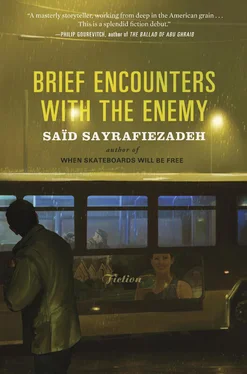Soon we were dropping the friend off in front of her parents’ large house. The house was dark except for one light that illuminated the driveway. “Good night! Good night!” she called.
I took the front seat and I noticed how wet my pants were. I noticed how close I was to the anorexic waitress. Back toward the city we went. In the gloomy swirl of rain, I could see the giant office building with its antenna that, in the darkness, looked like a cross on a church steeple.
“Do you want to hear a riddle?” she asked out of the blue.
“Okay,” I said.
She smiled broadly. Her teeth looked discolored. “There’s a cabin in the woods with two dead people. They are both strapped to chairs.” She paused to glance my way. “The doors of the cabin are blocked and the windows are sealed. The people did not die from murder, exposure, dehydration, suicide, fire, asphyxiation, disease, or starvation. What did they die from?”
She concentrated as if she were also trying to think of the answer. I thought about the word “starvation.” I had no idea what the answer was, so I guessed AIDS.
No.
I guessed again.
No.
“Should we really be talking about dying while you’re driving in the rain?” I asked. She let out a ghoulish movie laugh and pantomimed turning the wheel hard, as if to swerve into oncoming traffic. This made me tense. The windshield wipers beat out their rhythm. “What killed them?” she said again. We went around a bend, and the office building disappeared momentarily and then reappeared, so that its giant antenna resembled a needle stuck in an arm.
“It’s an airplane, silly,” she said. “They’re seat-belted into the cabin of an airplane that’s crashed in the woods.”
I thought about this, piecing it back together from the opposite end. “That’s a good riddle,” I said at last.
“I know,” she said. “I’ve got a lot of them.”
We were coming back over the railroad tracks that were about a mile from my apartment. A dishwasher from the restaurant once managed to elude the police who had come to arrest him in the middle of his shift, and not knowing where to go, he had run all the way to the tracks and hidden in the underbrush. They’d found him three hours later, covered in dirt, and taken him to jail. At his trial, he had pleaded no contest on the advice of his court-appointed lawyer so that he’d get only a three-year sentence. He had not known what the phrase meant, though, and so, standing in the courtroom in his baggy suit, he had said, “No contents ,” and everyone in the courtroom had laughed.
“What are you thinking about?” she asked me abruptly. “What are you so quiet for?”
I told her about the dishwasher, and she said, “That’s a funny story.” And then she said, “That’s a strange story.” After that she said she had thought about studying law but decided against it. But might study it after all.
“You’re a funny boy,” she said. “You know that?” And it was my turn to smile, because it’d been a long time since anyone had called me a boy. When had I crossed that line from boy to man? Whenever it was, the line had been so faint, so subtle, that I had missed it entirely. Maybe if I had been paying closer attention, things might have turned out differently for me.
“ ‘Boy,’ ” I said. “That’s a weird thing to call me.”
So she said it again. “Boy … boy … boy.” Teasing now. But suddenly she was no longer saying just “boy” but “pretty boy.” Or perhaps I had misheard her. “Pretty boy.” I wanted to ask if I was hearing her correctly, because the rain was loud, and the car was loud, and she was driving with great vigor along the wet streets, all the power of her skeletal limbs surging into the car. I watched her mouth, waiting for it to speak again. A wide mouth with wide lips. Her lips were the fleshiest part of her body. The second I looked back toward the street, I heard her say it again.
“Pretty boy,” she said. “Pretty, pretty boy.”
“Really?” I asked her. “Really?”
It was about a month after the war began that I took two boxes off the Walmart truck and hid them in the mop closet. I wasn’t proud of my behavior, considering I’m the assistant manager, but I was in love with a girl who might or might not have been in love with me. Either way, this was the necessary course of action.
When the truck pulled up to the loading dock, I opened it myself and walked around being a pest with my clipboard, punctilious and official, examining things, checking things off my list. The driver kept sighing and coughing and making all manner of frustrated sounds. “It takes as long as it takes,” I said. Finally he went to piss, and while he was away, I grabbed the boxes and fled to the mop closet. I took a big box of toilet paper, sixty-two count, and I took a big box of something else that I didn’t bother to look at. I just grabbed it. Cookies or cupcakes, I think it was. It didn’t matter. I didn’t care. Mr. Bildman didn’t care either. He took whatever you brought him. He took motor oil. He took nail polish remover. He took apples and oranges.
About an hour later, I tracked down Joey Joey in the break room, talking to three cashiers. He had his feet up on the chair like he owned the place, like an asshole. When he saw me, he stood up and saluted. The girls laughed. Jenna and Haley and Lisa Marie. He was putting on a show for them.
“I’m going to need your help with something,” I said.
“You got it, cap’n!” he said.
He calls me “cap’n” all the time and I’m not sure what he intends by it other than to irritate or possibly humiliate me. When he isn’t calling me “cap’n,” he’s calling me “sarge” or “colonel.” It might have been tolerable if there’d been some trace of irony in his voice. We’re friends, after all, we grew up together, we played Little League together, we graduated from high school together. But I’ve been promoted three times and he’s remained an associate. “You know why, right?” he said once. “It’s because you’re good-looking.” No, it’s because I’m more diligent than he, more industrious, and somewhat more intelligent. It’s also because while I was working my way up at Walmart — beginning with cleaning the bathrooms — he was selling prescription drugs, dressing as if every night was prom night, carrying a roll of money the size of a baseball, and driving around the city in an SUV with ROAD TO THE RICHES hand-lettered on the side. He was sure that this was it, that he had found his calling and the good times would never end. But the good times ended when he got arrested and the fear of God was put in him. I went to visit him twice at the county jail with Chip, who also went all the way back to Little League. A window with fingerprints separated us and we had to talk over a telephone, Chip and I taking turns. There was a disconcerting hitch in the mechanism so that Joey Joey’s lips moved before I heard the words in the receiver. It was like I was watching a movie that had been dubbed in English. He was wearing a baggy green shirt and an ID bracelet, and if you didn’t know any better, you would have thought he was a patient in a hospital, which I guess in some ways he was. He had a small bruise on the side of his head, and when I asked him how he had come by it, he told me he’d dropped a dumbbell lifting weights. It was a story I found hard to believe, since he’d never worked out in his life. He spoke at length about his innocence, about how it was all a misunderstanding. He was facing six to eight years, but he managed to affect an assertive, nonchalant voice, highly enunciated designed to persuade the authorities who were presumed to be listening in on the conversation (which may have accounted for the delay on the telephone). But his eyes were the opposite of confident; they were wide, white, and tense. The next time Chip and I went to visit, the warden had locked down the jail and visiting hours were suspended. We left Joey Joey twenty dollars on his account, along with a porno magazine. Not long after, he went to court with a decent lawyer and pleaded no contest to a misdemeanor. He ended up serving eight months. Ever since then he’s had some catching up to do.
Читать дальше












